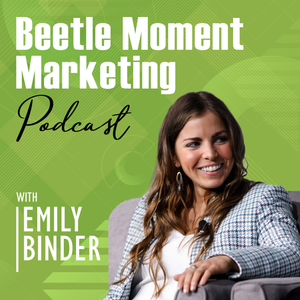
#10 Ian Morgan - How to get into Investment Banking
04/06/17 • 52 min
1 Listener
Ian Morgan is a former Managing Director at Société Générale who, after over 20 years as an investment banker, decided to become an entrepreneur in order to follow his passion. He is now an executive coach who provides a tailored coaching service designed specifically for finance industry professionals, in the fields of leadership, career management and interviewing. He is passionate about helping individuals reach new levels of achievement and performance.
for the full show notes go to: http://www.thewallstreetlab.com/
If the interview was valuable to you, make sure to take a few seconds to leave us a 5-Star review on iTunes.
[5:00] Ian’s background and all the projects he is involved with at the moment
[6:30] What made Ian quit his job as a Managing Director at a large Investment Bank to start running his own business.
[8:45] Ian describes his experience in resigning from his position as an MD and what the first day of running his own business felt like.
[11:15] What do successful candidates do that unsuccessful candidates generally do not?
[15:00] Cover letter writing strategies
[16:50] Ian shares his thought on networking best practices
[18:30] Practical skills for the job hunt if you did not major in business and finance.
[21:40] Is it too late to start a career in investment banking if you are in your late 20’s / early 30’s?
[23:50] Understanding the fact that interviewers also have cognitive biases and use that to our advantage during an interview
[25:50] The danger of trying to sound smarter that you really are during an interview
[27:50] Is it ok to answer an interview question with “I don’t know”?
[29:50] How much is too much when it comes to preparing for an interview?
[31:50] How do I accelerate my career at an investment bank, once I have a foot in the door?
[34:20] The performance formula
[36:50] Daily routines and habits that can help you become more productive at work
[41:30] Ways to avoid distractions at work
[44:10] The importance of reading; Ian’s book recommendations
[47:50] The importance of a “glass half-full” attitude
[49:10] Where you can find out more about Ian Morgan’s work
Stay tuned!
Luke & Leo
Ian Morgan is a former Managing Director at Société Générale who, after over 20 years as an investment banker, decided to become an entrepreneur in order to follow his passion. He is now an executive coach who provides a tailored coaching service designed specifically for finance industry professionals, in the fields of leadership, career management and interviewing. He is passionate about helping individuals reach new levels of achievement and performance.
for the full show notes go to: http://www.thewallstreetlab.com/
If the interview was valuable to you, make sure to take a few seconds to leave us a 5-Star review on iTunes.
[5:00] Ian’s background and all the projects he is involved with at the moment
[6:30] What made Ian quit his job as a Managing Director at a large Investment Bank to start running his own business.
[8:45] Ian describes his experience in resigning from his position as an MD and what the first day of running his own business felt like.
[11:15] What do successful candidates do that unsuccessful candidates generally do not?
[15:00] Cover letter writing strategies
[16:50] Ian shares his thought on networking best practices
[18:30] Practical skills for the job hunt if you did not major in business and finance.
[21:40] Is it too late to start a career in investment banking if you are in your late 20’s / early 30’s?
[23:50] Understanding the fact that interviewers also have cognitive biases and use that to our advantage during an interview
[25:50] The danger of trying to sound smarter that you really are during an interview
[27:50] Is it ok to answer an interview question with “I don’t know”?
[29:50] How much is too much when it comes to preparing for an interview?
[31:50] How do I accelerate my career at an investment bank, once I have a foot in the door?
[34:20] The performance formula
[36:50] Daily routines and habits that can help you become more productive at work
[41:30] Ways to avoid distractions at work
[44:10] The importance of reading; Ian’s book recommendations
[47:50] The importance of a “glass half-full” attitude
[49:10] Where you can find out more about Ian Morgan’s work
Stay tuned!
Luke & Leo
Previous Episode

#09 Alexander Doll - CEO of Barclays Germany Perspective on Investment Banking and M&A
Alexander Doll is the CEO of Barclays Germany and the Head of Banking for Germany, Austria and Switzerland. Prior to his role at Barclays, Mr. Doll served as a Managing Director of Financial Advisory Business at Lazard. Mr. Doll joined Lazard after eight years with UBS. His previous experience also includes working for Lehman Brothers in New York and Frankfurt.
For the full show notes please go to: http://www.thewallstreetlab.com/
Have you asked yourself what the best-case scenario for your career would be? I mean, if everything goes extremely well – you get along with your colleagues, you become a well-known and recognized expert in your field, you are being nicely rewarded financially for what you do - what would that look like for you? Will you be a CEO of a company? Or perhaps a successful investor or run your own business?
Regardless of what your answer is, there is one thing we can agree on - to get there, you are going to work extremely hard at it. You must master multiple skills, not only on the technical side of your craft, but also your interpersonal abilities. And, as we have heard from so many previous guests on our podcast, you are going to have to truly love what you do – “do it for the love of the game”, as Steven Gerbel said.
There is one thing that all guests on our show have in common – they have achieved a level of “success” that most of us can only dream of. We believe that, whenever you have a chance to talk to someone who has “been there”, regardless of the field they are in, we should all stop and listen, as we all stand to learn something new from them.
In fact, there is nothing stopping any of us from finding someone we admire and asking for 30 minutes of their attention. These overachievers are usually genuinely nice people who are more than willing to share their wisdom with eager souls looking to grow in their careers. This is exactly what Luke and I do with our interviews – the only difference is that we bring our audio recorder with us. Maybe all you are missing is an audio recorder!
Today is one of those days when we tell ourselves – “we are so glad to have recorded this”. In this wide-ranging conversation, you will get a glimpse at what it is like to be the regional CEO of a global investment bank. You will soon realize that you cannot climb the corporate later at an investment bank if you are not both good with the numbers, but most importantly, good with clients. Mr. Doll also tells us the differences between the M&A markets in Europe vs. the US, what he looks at when interviewing job candidates, and much more.
And now to the show notes!
- 1:40 How Mr Doll explains what he does
- 2:30 The story of how Mr doll started out in finance
- 04:45 How does Mr Doll's typical day look like
- 06:25 current developments in the M&A markets
- 07:50 differences between the investment banking environment in US and EU
- 09:54 What is the most important aspect when analysing an M&A deal?
- 11:40 Specialization, industry experts and their role in investment banking
- 12:55 What has changed the most since Mr Doll started out in investment banking?
- 14:30 How does Mr Doll deal with the information overload
- 16:20 News outlets that Mr Doll follows
- 16:50 Three pieces of advice to the younger self
- 18:50 Favourite mistake
- 19:20 A person who shaped Mr Dolls life
- 20:25 on mentorship
- 21:50 on importance of education and designations
- 23:00 Outside of work what takes the majority of your time?
- 24:50 If you could... What book would you make employees at your company read?
- 25:25 Daily Routines?
- 26:02 What questions would you ask in a job interview?
- 26:30 What is something that you believe to be true that most people do not believe to be true?
- 28:00 Is there anything you would like to leave our audience with?
If the interview was valuable to you, make sure to take a few seconds to leave us a 5-Star review on iTunes.
Stay tuned!
Luke & Leo
P.S: Our next episode will come out on March 6th, in which we cover the topic of interview preparation and career development with Ian Morgan, a former Managing Director of Société Générale turned executive coach focused on helping professionals succeed in the financial services industry.
Next Episode
![undefined - #11 [Special] How to Pass the CFA Exams](https://storage.googleapis.com/goodpods-images-bucket/episode_images/a27da9a693bac983e1a42d839861d96b0e32f675d343bc4269cd9d6d50b6d77f.avif)
#11 [Special] How to Pass the CFA Exams
Most of you are familiar with the CFA designation – the one that makes you lose at least 3 Springs of your life (if you are lucky), your friendships and sometimes your partner. The one that makes you, according to CFA Institute’s statistics, read 8,914 pages of material, study 3,865 equations and take 18 hours of examinations. It is true that studying for it can be a very daunting and time consuming task. But if you are really interested in it (and I am not here trying to convince you to become a CFA charterholder – although I think it is a great thing to do if you are passionate about finance), I think you are going to get a lot out of this episode.
For the full show notes go to: http://www.thewallstreetlab.com/
I have been asked many times over the years about tips and tricks on how to improve your chances of passing the CFA exams. So, in this special episode in which we decided to be the ones doing all the talking, Luke and I put together a list 18 points that may improve your chances of being more successful in studying for the CFA exams. I must say that the combination of the points shared during this podcast made a huge difference in my studying attitude and I like to think they have positively influenced my results. Please note, however, that these are tactics that have worked well for me, and may not work so well for others, so pick whatever idea you like most and try to implement it to your mindset.
Also, here is a spoiler alert – if you are looking for tactics and/or ideas on how to tackle specific CFA curriculum material, you will not find any of it here. There are plenty of resources online for that.
If you listened to the episode and still have any questions, feel free to send us an e-mail at [email protected] and we will do our best to answer any questions you may have.
Also, while we are at it, If the interview was valuable to you, make sure to take a few seconds to leave us a 5-Star review on iTunes.
Stay tuned!
Luke & Leo
If you like this episode you’ll love
Episode Comments
Generate a badge
Get a badge for your website that links back to this episode
<a href="https://goodpods.com/podcasts/the-wall-street-lab-60304/10-ian-morgan-how-to-get-into-investment-banking-3130712"> <img src="https://storage.googleapis.com/goodpods-images-bucket/badges/generic-badge-1.svg" alt="listen to #10 ian morgan - how to get into investment banking on goodpods" style="width: 225px" /> </a>
Copy




